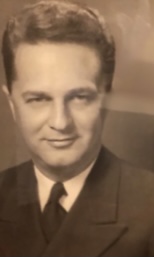
Henry Litvin
Henry Litvin was born on March 20, 1923, in Philadelphia, Pennsylvania. In Philadelphia, Henry completed high school, college, and received his medical degree from the University of Pennsylvania. Henry always felt that he was strictly a city boy who found himself in the middle of a war, having never gone farther from home than Florida.
Prior to the outbreak of the Korean War, Henry was recruited to enlist for two years of Naval service in exchange for four years of salary to help him through his unpaid medical internship at Philadelphia General Hospital. With World War II having recently ended, Henry never expected to end up in a far off foreign war fighting with the Marines corp. He proceeded to complete his internship, and was immediately deployed to Korea in September 1950 and participated in the Battle of Incheon and the Battle of the Chosin Reservoir.
Henry served as a Navy Doctor attached to the 2nd Infantry Battalion, 5th Regiment, 1st Marine Division. On September 15, 1950 he was transferred to Incheon where he took part in the surprise amphibious assault. Upon boarding an amphibious assault vehicle, Henry recalls being handed a rifle, and as a physician he was clueless as to what to do with it. At that time, physicians did not attend basic training so he swapped the rifle for a sidearm. Henry now found himself on the front lines of the Korean War. He remembers being bereft of sterile materials, food, water, and warmth, and recalls the difficulties this circumstance presented when treating patients in combat situations. It was under these conditions that as a medical doctor, he had to come to terms with the knowledge that he was unable to save everyone that he treated. This was especially true during the Battle of the Chosin Reservoir where the extreme conditions of frigid Korean winters froze and numbed his fingers.
Henry was honorably discharged from the Marines on March 1, 1951, after saving countless lives. His time in the Marines has stayed with him throughout the years. Even today, Henry remembers in startling detail a dog’s barks saving him and others from an explosion caused by an oil leak, He also vividly remembers seeing Ewha Women’s University, which is still standing today, and crossing the Han River in order to retake Seoul from Chinese troops.
As a physician, Henry had dedicated himself to providing the best possible medical care to every sailor, airman, soldier or marine he treated. His memories of his time in Korea and the men saved and the men lost have remained vivid and powerful. Today, Henry is retired and a proud grandfather. He remembers his time in Korea with emotion and astonishing detail.
Korean War - Key Events
September 12, 1950
North Korean troops reach their farthest point of advance. Although thousands of UN troops have arrived to reinforce South Korea, months of fighting have reduced the area under their control to a 5,000-square-mile rectangle centered on the critical southeastern port of Pusan. By the time the North Korean invasion force reaches the “Pusan Perimeter,” its strength has been nearly cut in half and it is almost entirely lacking in armor.
These events are taken from the Encyclopedia Britannica

Comments
Likes 1
You must be a registered user to comment or like - please register to join us!